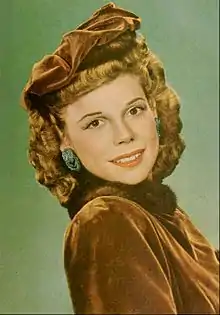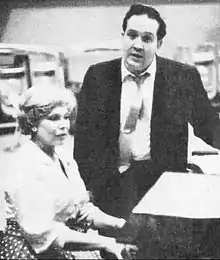Joan Edwards (radio singer)
Joan Edwards (February 13, 1919 – August 27, 1981)[1] was an American singer in the old-time radio era.[2] She was perhaps best known for her work on the radio version of Your Hit Parade.[3]:778 She also was a vocalist for Paul Whiteman and His Orchestra.
Joan Edwards | |
|---|---|
 Edwards in 1945 | |
| Born | February 13, 1919 New York City, New York, U.S. |
| Died | August 27, 1981 (aged 62) New York City, New York, U.S. |
| Nationality | American |
| Alma mater | Hunter College |
| Occupation | Singer |
| Spouse(s) | Julius Schachter |
| Children | 3 daughters, 1 son |
| Parent(s) | Mr. and Mrs. Ben Edwards |
Early years
Edwards' father was Ben Edwards, a song plugger. Music ran in her family; uncle Gus Edwards was a vaudeville entertainer, uncle Leo Edwards wrote music, and aunt Dorothy Edwards was a vocal teacher.[4] Despite the family's show business background, she was urged to go in a different direction. In fact, Gus Edwards told her, "Stay out of show business."[5]
As a child, Edwards had a heart murmur, and doctors advised her to start playing the piano "to keep her busy outside of school hours."[6] She graduated from George Washington High School in Manhattan,[7] where she directed the glee club. She went on to major in music at Hunter College,[8] planning to be a teacher. However, her interest in singing and playing the piano won out, leading to a career in music.[7]
Radio
Edwards' early appearances on radio came "via small stations in New York City."[2] Her first network appearance was on Fred Allen's program.[9]
Beginning March 3, 1941, Edwards had her own program, Girl About Town, on CBS. The 15-minute show was broadcast Wednesdays and Fridays at 10:30 p.m. Eastern time. Although her singing was featured, she played the piano for one song in each episode.[10]
In December 1941, Edwards was selected as the new female soloist on Your Hit Parade.[11] Three years later, an article in Tune In magazine observed, "Joan Edwards sets something of a record, lasting through the regimes of three male singers -- Barry Wood, [Frank] Sinatra, [Lawrence] Tibbett -- in a three-year period."[12] Her tenure on the program eventually reached five years,[8] and the list of male singers' names grew to include Dick Todd and Johnny Mercer.[13] She was dropped from Your Hit Parade in 1947 when the sponsor, American Tobacco Company, changed format, using guest stars rather than regular soloists.
Edwards was a regular on The Danny Kaye Show[3] and on Songs for Sale.[14] She was also heard on George Jessel's program, Duffy's Tavern,[5] Here's to Romance,[15] and Swing Session,[10]
On March 3, 1952, Edwards began a morning disc jockey program on WCBS-AM in New York City.[16]
Television
Edwards had her own program, The Joan Edwards Show, on the DuMont Television Network in 1950. The 15-minute program was broadcast on Tuesday and Thursday nights. She also was seen in a TV version of her Girl About Town radio program in 1941.[17]
Personal appearances
Edwards' first job after finishing at Hunter College was performing with Rudy Vallee.[4] Her guest appearance on his radio program was so successful that she toured the United States with Vallee and his orchestra for eight months.[5] She also appeared with bandleader Paul Whiteman and with her uncle, vaudevillian Gus Edwards.[2] A December 6, 1941, newspaper article reported that she had "played the leading vaudeville theaters in the country."[11] In the early 1940s, she also was "appearing at one of Broadway's top night clubs."[10]
In 1942, Edwards performed at the Copley-Plaza hotel in Boston, Massachusetts, with what one newspaper columnist called "the year's most unusual night-club contract."[18] The time off was reserved so that she could fly to New York City to perform on Your Hit Parade on Saturdays.[18] In 1950, she appeared on stage at the Capitol Theatre in a show with bandleader Russ Morgan and others.[19]
Film
Edwards appeared in Hit Parade of 1947.[7]
Composing

Edwards was co-composer of the Broadway musical Tickets, Please! (1950).[8][20] She also "wrote scores for nightclub revues as well as many successful advertising jingles."[8] Edwards and Lyn Duddy wrote the songs for Arthur Godfrey's songbook Arthur Godfrey's TV Calendar Songs, published 1953.
Personal life
Edwards was married to Julius Schachter, a violinist who died in 1976. They had three daughters and one son.[8]
Death
Edwards died in Manhattan, New York, of an apparent heart attack, August 27, 1981.[8]
Partial discography
- When I Go a Dreamin' - with Paul Whiteman, 1938 (Decca 2076)[21]
- Moon Love/To You - with Paul Whiteman, 1939 (Decca 2578)[22]
- My Fantasy - with Paul Whiteman, 1940 (Decca 2937)[23]
- Darn It, Baby, That's Love - with Johnnie Johnston, 1950 (MGM 10711)[24]
References
- Castronova, Frank V., ed. (1998). Almanac of Famous People. Detroit: Gale. p. 530. ISBN 0-7876-0045-8.
- Grunwald, Edgard A., Ed. (1940). Variety Radio Directory 1940-1941 (PDF). New York City, New York: Variety, Inc. p. 927. Retrieved 1 May 2016.
- Sies, Luther F. (2014). Encyclopedia of American Radio, 1920-1960, 2nd Edition. McFarland & Company, Inc. ISBN 978-0-7864-5149-4. P. 177.
- Peacock, Ray (January 20, 1942). "Joan Didn't Mind Parents, But She's doing All Right". Texas, Corpus Christi. Associated Press Features. p. 2-B. Retrieved May 1, 2016 – via Newspapers.com.
- "Little Miss Contrary". Radio Romances. 24 (4): 53. September 1945. Retrieved 4 May 2016.
- "Your Hit Parade" (PDF). Radio Album. December 1938. p. 16.
- Mara, Margaret (August 14, 1946). "She Is Determined to Keep Makeup Artists Out of Her Hair". The Brooklyn Daily Eagle. New York, Brooklyn. p. 15. Retrieved May 1, 2016 – via Newspapers.com.

- Flint, Peter B. (August 29, 1981). "Joan Edwards, Radio Singer and Star of 'Your Hit Parade'". The New York Times. Retrieved 3 May 2016.
- Lewis, Martin (April 8, 1939). "Airalto Lowdown" (PDF). Radio Guide. pp. 13, 40. Retrieved 3 May 2016.
- "Joan Edwards Heads New Song Series as 'Girl About Town'". Harrisburg Telegraph. Pennsylvania, Harrisburg. March 1, 1941. p. 28. Retrieved May 1, 2016 – via Newspapers.com.

- "Blues Singer Called Back". The Mason City Globe-Gazette. Iowa, Mason City. December 6, 1941. p. 11. Retrieved May 1, 2016 – via Newspapers.com.

- "Your Hit Parade" (PDF). Tune In. May 1945. pp. 9–11. Retrieved 3 May 2016.
- Dunning, John (1998). "Your Hit Parade". On the Air: The Encyclopedia of Old-Time Radio (Revised ed.). New York, NY: Oxford University Press. pp. 738-740. ISBN 978-0-19-507678-3. Retrieved 2019-10-18.
Your Hit Parade, popular music Dick Todd Johnny Mercer.
- Terrace, Vincent (1999). Radio Programs, 1924-1984: A Catalog of More Than 1800 Shows. McFarland & Company, Inc. ISBN 978-0-7864-4513-4. P. 310.
- "Joan Edwards Guest On "Here's to Romance" Tonight at Seven, WHP". Harrisburg Telegraph. Pennsylvania, Harrisburg. March 17, 1945. p. 16. Retrieved May 1, 2016 – via Newspapers.com.

- "Joan Edwards Wins DJ Strip on CBS". Billboard. February 23, 1952. p. 10. Retrieved 3 May 2016.
- Brooks, Tim & Marsh, Earle (1979). The Complete Directory to Prime Time Network TV Shows: 1946-Present. Ballantine Books. ISBN 0-345-25525-9. P. 307.
- Rathbun, Joe (October 18, 1942). "Joe's Radio Parade". The Times Recorder. Ohio, Zanesville. p. 11. Retrieved May 1, 2016 – via Newspapers.com.

- "Long Runs, Fast Faders Pull Stem Combo Take to 342G". Billboard. May 6, 1950. p. 51. Retrieved 3 May 2016.
- "Tickets, Please!". Playbill. Retrieved 3 May 2016.
- "Wax Worth Watching" (PDF). Radio Today. November 1938. p. 53. Retrieved 2 May 2016.
- "Wax Worth Watching" (PDF). Radio Today. August 1939. p. 14. Retrieved 2 May 2016.
- Rayno, Don. Paul Whiteman: Pioneer in American Music. Volume II: 1930-1967. Lanham, MD: Scarecrow Press, 2013, p. 705.
- "Record Reviews". Billboard. June 3, 1950. p. 118. Retrieved 3 May 2016.